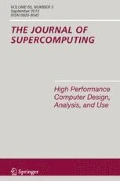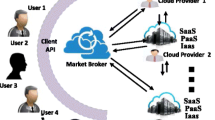Abstract
The recent development in Cloud computing has enabled the realization of delivering computing as an utility. Many industries such as Amazon and Google have started offering Cloud services on a “pay as you go” basis. These advances have led to the evolution of the market infrastructure in the form of a Market Exchange (ME) that facilitates the trading between consumers and Cloud providers. Such market environment eases the trading process by aggregating IT services from a variety of sources, and allows consumers to easily select them. In this paper, we propose a light weight and platform independent ME framework called “Mandi”, which allows consumers and providers to trade computing resources according to their requirements. The novelty of Mandi is that it not only gives its users the flexibility in terms of negotiation protocol, but also allows the simultaneous coexistence of multiple trading negotiations. In this paper, we first present the requirements that motivated our design and discuss how these facilitate the trading of compute resources using multiple market models (also called negotiation protocols). Finally, we evaluate the performance of the first prototype of “Mandi” in terms of its scalability.
Similar content being viewed by others
References
Altmann J, Courcoubetis C, Darlington J, Cohen J (2007) GridEcon-the economic-enhanced next-generation internet. In: Proceedings of the 4th international workshop on grid economics and business models, Rennes, France
Neumann D, Stoesser J, Anandasivam A, Borissov N (2007) Sorma-building an apen Grid market for Grid resource allocation. In: Proceedings of the 4th international workshop on Grid economics and business models, France
Broberg J, Venugopal S, Buyya R (2008) Market-oriented Grids and utility computing: the state-of-the-art and future directions. J Grid Comput 6(3):255–276
Eymann T, Reinicke M, Ardaiz O, Artigas P, Freitag F, Navarro L (2003) Decentralized resource allocation in application layer networks. In: Proceedings of the 3rd international symposium on cluster computing and the Grid, Tokyo, Japan
Abramson D, Buyya R, Giddy J (2002) A computational economy for grid computing and its implementation in the nimrod-G resource broker. Future Gener Comput Syst 18(8):1061–1074
Venugopal S, Nadiminti K, Gibbins H, Buyya R (2008) Designing a resource broker for heterogeneous Grids. Softw Pract Exp 38(8):793–826
Huedo E, Montero R, Llorente I, Thain D, Livny M, van Nieuwpoort R, Maassen J, Kielmann T, Bal H, Kola G et al (2005) The GridWay framework for adaptive scheduling and execution on Grids. Softw Pract Exp 6:1–8
Lai K, Rasmusson L, Adar E, Zhang L, Huberman B (2005) Tycoon: an implementation of a distributed, market-based resource allocation system. Multiagent Grid Syst 1(3):169–182
Altmann J, Ion M, Adel A, Mohammed B (2007) A taxonomy of grid business models. In: Proceedings of the 4th international workshop on grid economics and business models, Rennes, France
Eriksson H, Penker M (2001) Business modeling with UML: business patterns at work. Wiley, New York
Chu X, Nadiminti K, Jin C, Venugopal S, Buyya R (2007) Aneka: next-generation enterprise Grid platform for e-science and e-business applications. In: Proceedings of the 3th IEEE international conference on e-science and grid computing, pp 10–13
Shirazi J (2003) Java performance tuning. O’Reilly Media
Padala P, Harrison C, Pelfort N, Jansen E, Frank M, Chokkareddy C (2003) OCEAN: the open computation exchange and arbitration network, a market approach to meta computing. In: Proceedings of the 2nd international symposium on parallel and distributed computing, Ljubljana, Slovenia
AuYoung A, Chun B, Snoeren A, Vahdat A (2004) Resource allocation in federated distributed computing infrastructures. In: Proceedings of the 1st workshop on operating system and architectural support for the on-demand IT infrastructure, NV, USA
Varia J (2011) Architecting applications for the Amazon cloud. In: Buyya R, Broberg J, Goscinski A (eds) Cloud Computing: Principles and Paradigms. Wiley Press, New York, USA, pp 249–274. ISBN-13:978-0470887998
Author information
Authors and Affiliations
Corresponding author
Rights and permissions
About this article
Cite this article
Garg, S.K., Vecchiola, C. & Buyya, R. Mandi: a market exchange for trading utility and cloud computing services. J Supercomput 64, 1153–1174 (2013). https://doi.org/10.1007/s11227-011-0568-6
Published:
Issue Date:
DOI: https://doi.org/10.1007/s11227-011-0568-6




